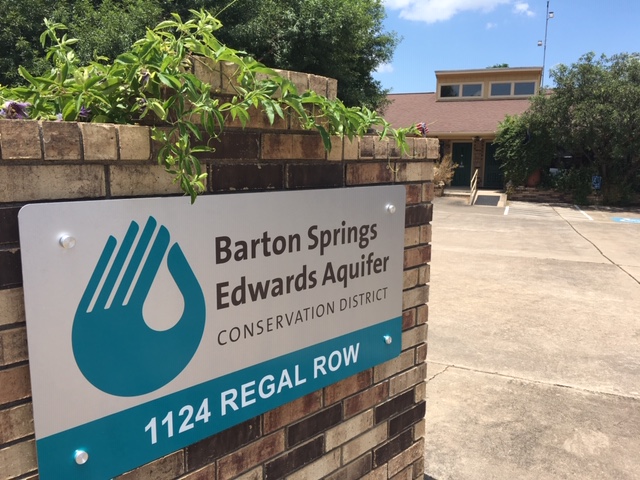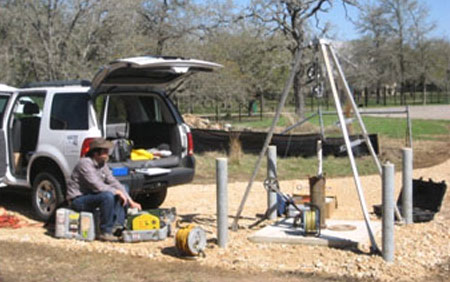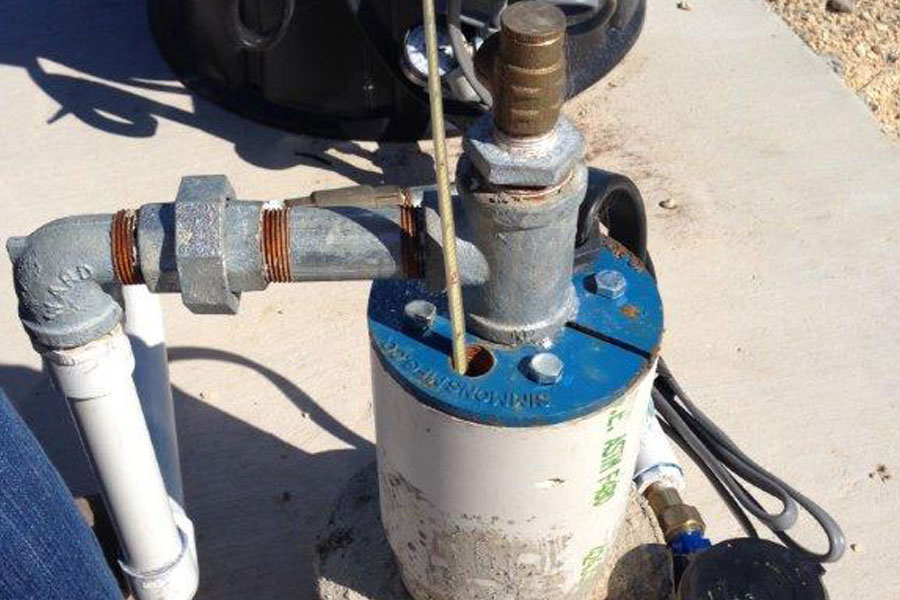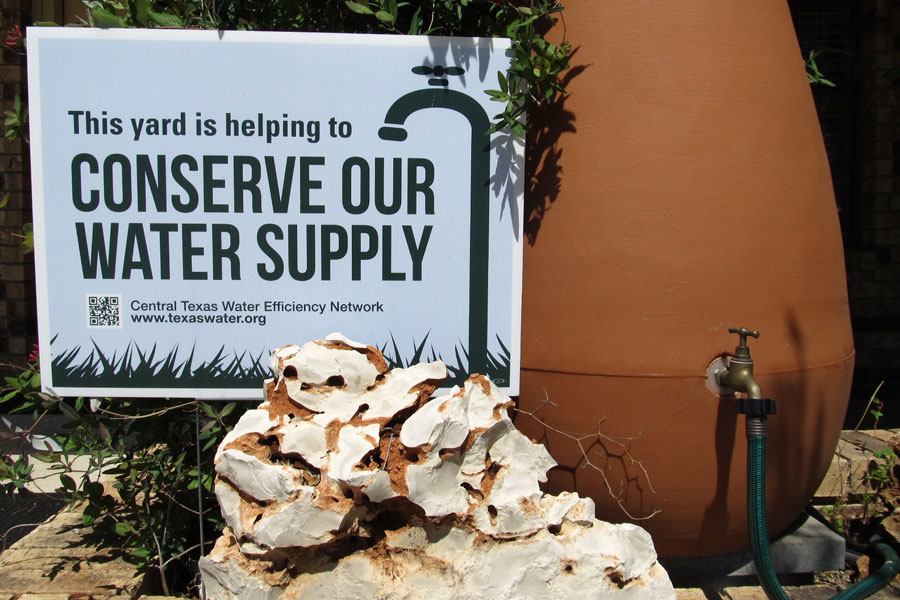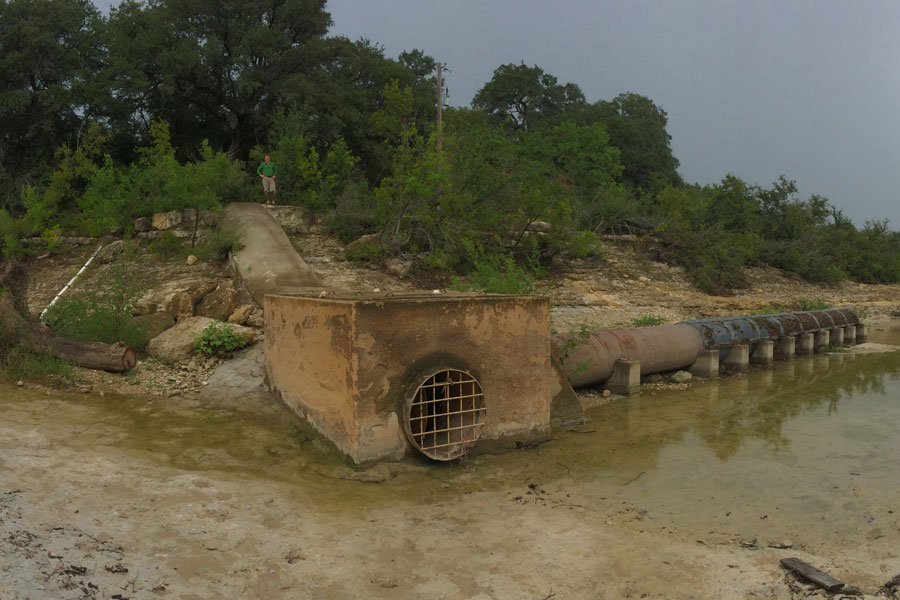Well Owner Information
Online Well Registration Form
Complete this form to register your well and contact information with the District. All wells within the District are required to be registered with the District. You can now submit a Well Registration form online via our new Well Registration Quicklink. The form takes a few minutes to fill out. If you would prefer to print and submit a hard copy form, you can download the pdf Well Registration form. Before you begin to fill out the Well Registration Form, it will be helpful to lookup the following information if you have it available: well depth, date drilled, well coordinates, well driller.
Submitting a Meter Reading
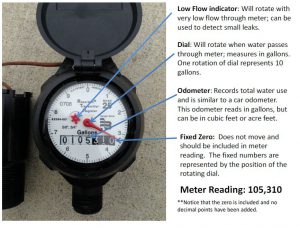
Well owners with a permitted well should submit their meter reading every month by the 5th. It is important that permittees know how to read their water meter accurately, as it is essential in tracking, managing, and conserving groundwater use. Water meters come in a variety of makes and models and may measure water in different units (gallons, acre feet, or cubic feet). However, the following example is a commonly used throughout the District for domestic and livestock wells (5/8” x 3/4” line) and is read in gallons.
When reading your meter, it is important to include any “fixed zeros” to the right of the movable numbers. The meter reading in the example below is 105,310 gallons. Notice that the zero is included and no decimal points have been added.
-
Individual Permit Holders – Industrial, Irrigation, Commercial, Public Water Supply, Agricultural Users: Submit this form monthly by the 5th.
-
Limited Production Permit (LPP) Holders – Domestic/Residential Users: Submit an online form annually by September 5th or submit this paper form.
Detecting a Water Leak
The best way to determine a leak is by monitoring your water meter. Turn of all water indoors and outdoors, including sprinklers, ice makers, etc and observe meter. If the low flow indicator moves, it may indicate a small, consistent leak. If the meter shows no obvious movement upon initial observation, record meter and return in a couple hours to see if there is any change; be sure not to use any water during the wait period.
Water Quality in Your Well
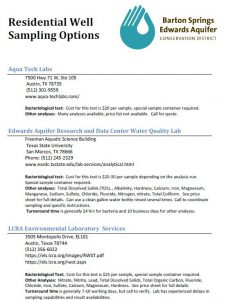 Private water wells should be tested annually for contaminants that can jeopardize the health of its users, especially vulnerable populations like children, the elderly, or those with compromised immune systems. You can collect a sample from your well and submit it to a local lab if you have concerns about your well water quality. Some constituents that you may want to sample for are:
Private water wells should be tested annually for contaminants that can jeopardize the health of its users, especially vulnerable populations like children, the elderly, or those with compromised immune systems. You can collect a sample from your well and submit it to a local lab if you have concerns about your well water quality. Some constituents that you may want to sample for are:
- Ecoli & Total coliform bacteria – The presence of fecal coliform bacteria in water indicates that waste from humans or warm-blooded animals may have contaminated the water. Water contaminated with fecal coliform bacteria is more likely to also have pathogens present that can cause diarrhea, cramps, nausea, or other symptoms.
- Nitrates – Water with nitrates at levels of 10 parts per million (ppm) is considered unsafe for human consumption. Nitrate levels above 10 ppm can disrupt the blood’s ability to carry oxygen throughout the body, resulting in a condition called methemoglobinemia. Infants less than 6 months of age and young livestock are most susceptible.
- TDS – Salinity as measured by Total Dissolved Solids (TDS) is also an important characteristic. Water with high TDS levels may leave deposits and have a salty taste. Additionally, using water with high TDS for irrigation may damage the soil or plants.
There are a variety of local laboratories that can test residential well samples. If you missed our Annual Water Well Check-up, you can contact a local lab to coordinate the analysis.
Well Owner Guide
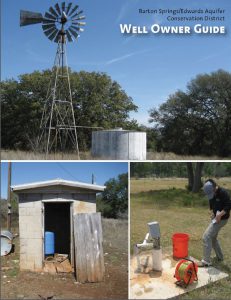 The Well Owner Guide covers a wide variety of topics. Groundwater is a shared resource, and all well owners can do their part to help protect water quality and availability in the District. Download the guide today, or stop by the office for a hardcopy.
The Well Owner Guide covers a wide variety of topics. Groundwater is a shared resource, and all well owners can do their part to help protect water quality and availability in the District. Download the guide today, or stop by the office for a hardcopy.
Includes information on:
- District Overview
- Regional Aquifers
- Well Head Protection
- Well Construction
- Water Quality
- Well Maintenance
- Drought Impacts
- Water Conservation
- Aquifer Management
- Online Resources
Selecting a Well Driller or Pump Service
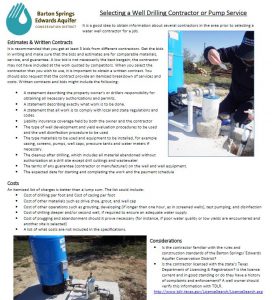 It is a good idea to obtain information and estimates from a few different contractors in the area prior to selecting a water well contractor for a job. For tips on selecting a well contractor read through the District’s handout on Selecting a Well Drilling Contractor or Pump Service.
It is a good idea to obtain information and estimates from a few different contractors in the area prior to selecting a water well contractor for a job. For tips on selecting a well contractor read through the District’s handout on Selecting a Well Drilling Contractor or Pump Service.
Licensed driller information may be obtained from the Texas Department of Licensing and Regulation. The District recommends that all applicants verify that the contracted driller has a current license that is in good standing. Verify a driller’s license through the Texas Department of Licensing and Regulation License Search.
